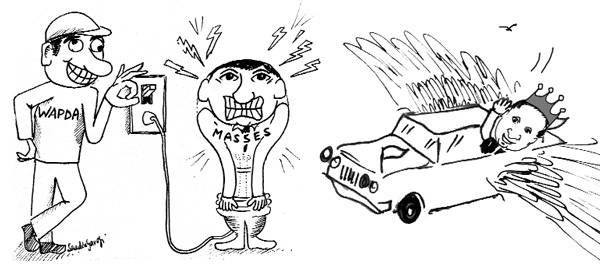
High time
Sir,
Gen Raheel Sharif must be complimented on the bold initiative to embark on a military operation in North Waziristan to eliminate terrorist outfits threatening to destabilize Pakistan by refusing to accept the writ of the constitution and enforce their own version of religion on us. After years of dillydallying by his predecessors, he had the courage, professional integrity and commitment to start this much-needed operation, which if carried out earlier would have saved thousands of precious human lives, apart from billions of dollars in loss to the national economy.
However, we also need to think about the post-operation measures necessary to achieve the desired results. It must be understood that failure to restore order after the chaos of war ends and the terrorists have been defeated will create a vacuum. It is important that military commanders on the ground work in coordination with civil administration to put in place an effective system of governance which can provide relief and justice to people. The old decadent system of political agents is a relic of the British Raj and must be replaced by a more representative system of governance with the local population having a role. This can only be achieved through constitutional amendments and laws enacted on an emergency basis to bring FATA under the ambit of the constitution, giving its people uniform fundamental rights enjoyed by all citizens of Pakistan. If we fail to do so, these terrorists will be replaced by some other brand of extremists, and the precious sacrifices made by our soldiers and citizens would be in vain. There will be a lot of opposition by powerful groups with vested interests for whom the status quo has allowed them to reap a bonanza in terms of illegal trades they have been involved in.
But it is time to adopt the Quaid’s doctrine of a modern democratic welfare state, with no tolerance for corruption, with an apolitical civil and military bureaucracy, and with an effective independent judiciary. It is time to shelve the failed doctrines of the past. We must re-evaluate our security policy in coordination with our regional neighbors instead of a singular reliance on one super power.
Tariq Ali,
Lahore.
Tax or perish
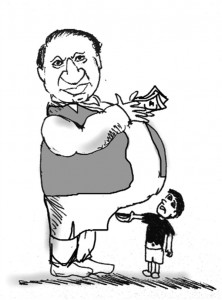
Sir,
The anger on the streets is escalating because millions have been driven to desperation because of years of neglect, injustice, exploitation and the rising prices of essentials. Those who throng political protests are doing so not for the love of Pakistan Tehrik-e-Insaf, but because of frustration and neglect by successive governments failing to provide them relief from increasing inflation.
Prime Minister Nawaz Sharif must realize that increasing foreign exchange reserves or raising another billion dollars through Sukuk Bonds does not provide two meals a day to those earning the minimum wage or paying for utilities. The cumulative effect of massive corruption and organized tax evasion by the affluent rich for over three decades has reached a saturation point, and the only remedy is to cut down on indirect taxes and impose direct taxes on the rich, who defiantly refuse to pay their dues.
This government is facing agitation because they chose to be in power after having made some promises. The people of Pakistan, having endured eight years of military dictatorship and 5 years of President Asif Zardari’s government, in which corruption thrived and private militias emerged, reposed their trust in the Pakistan Muslim League-Nawaz and gave it a clear mandate.
Numerous leaders from the US, the UK and other European nations, as well as the IMF and the World Bank are on record that it is time Pakistan’s affluent rich start paying taxes so that the tax-to-GDP ratio improves. Unfortunately, successive governments in power have refused to levy direct taxation on all sources of income, and instead opted to bridge the gap by indirect taxes, which are burdening the poor. This unacceptable injustice has made lives of ordinary citizens a misery.
Meanwhile, unchecked population growth because of illiteracy and resultant food scarcity has been aggravated by diminishing green agriculture belts around every major urban centre being converted to concrete jungles.
The prime minister has to decide whether he will continue to protect, like his predecessors, the few hundred thousand affluent rich traders, retailers, real estate tycoons and members of the corrupt land mafia, or face the wrath of angry millions, seeking change for the better and willing to start agitation with hopes that somebody else may deliver.
Time is running out and mere statements will not mellow the anger and frustration driven by abject poverty and hunger.
Aamir Abbas,
Islamabad.
Handshake hopes
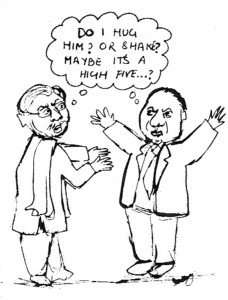
Sir,
Speculations were abound during the 18th SAARC summit held in the Nepalese capital Kathmandu regarding a possible one-on-one meeting between Pakistani premier Nawaz Sharif and his Indian counterpart Narendra Modi.
But no indication whatsoever emanated particularly from the Indian prime minister’s side of a possible meeting. The chances of a meeting became grimmer particularly when Sharif categorically stated that since the Indian side is responsible for the impasse in the bilateral talks between India and Pakistan, they will resume only if India takes an initiative.
In their speeches, both the leaders raised bilateral issues that were pertinent to the interests of their two countries. Sharif spoke about the long-pending bilateral issue of Kashmir seeking its immediate resolution in the larger interest of the two countries. Taking the rostrum, Modi not only lambasted Pakistan’s views on the issue, but also criticized SAARC for evoking cynicism and scepticism. “We have failed to move with the speed that our people expect and want,” he said. “Nowhere in the world are collective efforts more urgent than in South Asia and nowhere else is it so modest.”
The ice, however, was ultimately broken during the closing session on November 27 when Modi and Sharif, to the pleasant surprise of everyone present at the summit, ultimately chose to shake hands after giving a cold shoulder to each other for two days. The summit naturally echoed in applause.
The important question is whether the handshake was meaningful or illusive? If it was illusive, meant solely for the consumption of the media and those in attendance at the summit, then one would be compelled to say that it was truly very unfortunate. On the contrary, if it was sincere and was meant for resumption of the stalled bilateral dialogue between the two countries, then it certainly is worthy of genuine appreciation. Only time will prove the real motive behind the handshake.
M Fazal Elahi,
Islamabad.
Trade ties
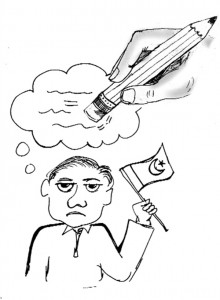
Sir,
Historical relations cannot always be a yardstick for ties in future. Foreign policy is often guided by pragmatism and national interests. China and Japan, despite a tumultuous history, have learnt to live together and cooperate for their good rather than grieving over their past. Similarly, European history tells drastic war stories between all European powers. Germany and France for example are the historical rivals. But they have learnt to live with each other as a community, they have realized that what they did in past was not at all in their benefit. Territorial gains and nationalistic spirits are not that significant as is the protection of basic human rights and formation of a welfare society as is European Union. India and Pakistan need much to learn from these examples.
Increasing trade relations between these two can not only benefit them by a boost in their economies but will also help deescalate their rivalry. Following the 1965 war, India-Pakistan trade fell drastically and came to a near standstill for almost nine years in the aftermath of this war. In the more recent history, India stopped trade via land and air routes following the attack on Indian Parliament in 2001 for some time. In 2013, trade was blocked following cross-border firing. India had not allowed Pakistan the access to Nepal, Bangladesh and Bhutan through its territory and in return Pakistan did not give transit rights to India for Afghanistan. This significantly affected trade potential, even with other neighbors.
There are ample business opportunities between the two nations ranging from joint ventures, outsourcing, technology transfers, Indian Special Economic Zones in Pakistan near the border, opening up of the Munabao-Khokhrapar route for trade, and people-to-people movement, a facilitative visa regime, mutual recognition of standards, harmonization of customs regulations and procedures, to an alternate dispute resolution mechanism, and cross-border banking facilities. Moreover, granting of MFN status to India by Pakistan would also benefit in low tariffs and high import quotas to Pakistan by India.
The SAARC aspiration for greater economic cooperation has been suffering serious jolts due to the bilateral rivalry between two of its largest nations – India and Pakistan. The platform of SAARC should be used by both states for mutual cooperation and healthy negotiations to bring up some consensus on rivalry issues and to focus on building up of trade links.
I do not perceive an ideal relationship with India immediately, but if we enhance our economic interdependence, that would reduce animosity with the passage of time.
Saleha Zia,
Rawalpindi.
Art of diplomacy
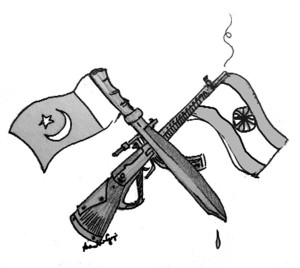
Sir,
According to newspaper reports, several lives were lost in the recent border skirmishes between Pakistan and India. Statements by military leaders made headlines on both sides. But that seems to be the norm in ties between Islamabad and New Delhi. The foreign offices would send a spokesman to condemn the clashes in the media, but fail to solve the matter diplomatically. In India, the new Modi government fueled the sentiments of anger instead of deescalating tensions.
While all this was going on, there was a horrific bomb attack on the Wagah border. All fingers were pointed towards a radicalizing India, but then local terrorist groups who claim to be fighting for religion began to claim responsibility.
Talks between the two neighbors are like a separated couple arguing in court. There are demands of tons of preambles and preconditions consisting of ifs and butts and then but-ifs. There are no agreements.
Diplomatic adventures are never a success here in the subcontinent. Foreign offices are merely congratulating friends and condemning enemies. Where is diplomacy and negotiation?
After World War II, Germany and France replaced a 300-year-old rivalry with cooperation with quick diplomatic encounters rather than sitting in offices being skeptical and making guesses about the hidden intentions of their rival. That is what should happen in the subcontinent too.
Azka Durrani,
Rawalpindi.
Why nations fail
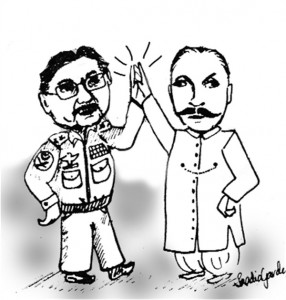
Sir,
Had we followed the constitutional path envisioned by our founder Muhammad Ali Jinnah, this country would have been a modern democratic welfare state free of the chaos and corruption that inflicts it like a cancer.
It is people living together, their attachment to their motherland, their deep stake in its existence, their belief that justice and freedom are guaranteed, and their trust that all institutions of the state are there to serve and protect them, which keeps a nation intact. Without justice, freedom, equal opportunities and laws, no state can exist. In the words of former US President Abraham Lincoln, “Let us have faith that right makes might, and in that faith, let us, to the end, dare to do our duty as we understand it.”
No instrument of state, not even the armed forces, can serve as a binding force in isolation, unless all institutions work in unison, each performing its constitutional and legal role, and all of them answerable to people, submitting to laws and supremacy of the constitution and its interpretation by the judiciary.
Let us not forget that the Soviet Union collapsed in spite of its mighty armed forces with their stockpiles of lethal weaponry, because those at the helm did not provide welfare to the most deprived sections of the society, and the role of their president Mikhail Gorbachev who betrayed his country. It was the military dictator General Ziaul Haq who compromised our sovereignty by allowing our land to be used as a sanctuary for foreign fighters, and the state, instead of performing its constitutional obligation to provide education and health, forfeited it by allowing unregulated growth of madrassas, which became nurseries of terrorism.
It was men like President Gen Ayub Khan, driven by greed and ambition, who are responsible for sowing the seeds of discord that led to the dismemberment of Pakistan in 1971, when instead of accepting the legal and moral right of majority rule, Gen Yahya Khan ordered military action against those demanding their right.
Gen Pervez Musharraf was no messiah either, nor were the corrupt politicians who were with or against him, who robbed the state of billions of rupees or were involved in manipulated loan defaults.
It is time that laws prevail over individual whims, with justice and security for all. Merit must prevail and no criminals involved in any heinous crime or robbery, whatever their political affiliations or beliefs, should be allowed to escape the majesty of law, if we are serious in eliminating terrorism.
Ali Malik,
Lahore.

